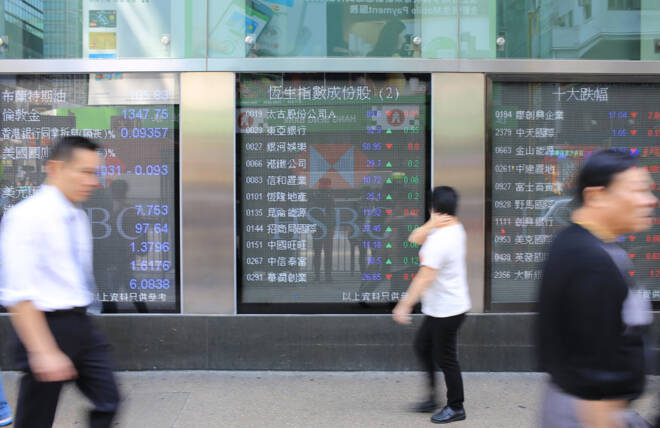Advertisement
Advertisement
Hang Seng Index Down as China’s Inflation Decline and Stimulus Hit Market Sentiment
By:
Key Points:
- China’s deflationary trend adds pressure on Hang Seng and Mainland equities, driving tech and real estate stocks lower.
- BoJ policy uncertainty and weak Yen weigh on Nikkei, with Tokyo Electron and Nissan leading market losses.
- ASX 200 slumps as mining stocks tumble; investor sentiment dims on weak Chinese demand and deflation concerns.
US Markets: Trump Trade Lifts Stocks
On Friday, November 8, US equity markets ended the week on a high. The Dow and the S&P 500 saw gains of 0.59% and 0.38%, respectively, while the Nasdaq Composite Index edged up 0.09%.
Market expectations of deregulation and tax cuts drove buyer demand for US-listed stocks. US economic indicators contributed to the upside.
Michigan Consumer Sentiment Rises
On Friday, the Michigan Consumer Sentiment Index increased to 73.0 in November, up from 70.5 in October. While sentiment toward current economic conditions weakened, consumers showed a more optimistic outlook. Consumer sentiment toward income and personal finances surged, suggesting upward trends in personal spending, which may push inflation higher.
Nevertheless, the November survey aligned with expectations for a soft US economic landing, supporting demand for riskier assets.
China Deflationary Pressures Accelerate in October
Weekend inflation figures from China set the tone for the Monday Asian session. Consumer prices fell by 0.3% month-on-month in October after holding steady in September, signaling weaker demand. Significantly, producer prices fell at a faster pace, indicating further deflationary pressures.
The figures highlighted the weak demand environment, a bugbear for investors. Last week, the Standing Committee National People’s Congress rolled out stimulus measures to support the economy. However, the absence of measures to target consumer consumption left investors disappointed.
Weaker domestic consumer consumption and the threat of Trump tariffs on Chinese goods dampened demand for Hong Kong and Mainland China-listed stocks.
Expert Views on China’s Stimulus Measures
AsiaMoney Strategist and Economist Hao Hong commented on China’s stimulus measures, stating,
“The market is nevertheless disappointed. Also there is mention about consumption stimulus. The market always wants it ALL AND NOW. This is a classic case study for expectation management.”
Hang Seng Index and Mainland China Equities Retreat on Demand Woes
In Asian markets, the Hang Seng Index was down 2.64% on Monday morning, with real estate and tech stocks bearing the brunt.
The Hang Seng Mainland Properties Index tumbled by 4.16%, while the Hang Seng Tech Index declined by 2.55%. Tech giants Alibaba (9988) and Baidu (9888) saw losses of 2.45% and 3.88%, respectively.
Mainland China’s equity markets also retreated following the inflation figures. The CSI 300 declined by 0.34%, while the Shanghai Composite edged 0.11% lower.
Nikkei Drops into Negative Territory Amid BoJ Policy Uncertainty
In Japan, the Nikkei Index fell 0.29% on Monday morning, while the USD/JPY advanced by 0.46% to 153.267. A weaker Japanese Yen limited the downside as investors digested the Bank of Japan’s Summary of Opinions. Uncertainty looms as the BoJ’s rate path remains unclear.
The Summary of Opinions highlighted the BoJ’s focus on Japanese Yen trends in deciding whether to raise interest rates. However, board member views were mixed, fueling uncertainty about the BoJ rate path, affecting demand for Nikkei Index-listed stocks.
Tokyo Electron (8035) declined by 1.25%, while Nissan Motor Corp. (7201) slid by 4.65%. Investors continued reacting to Nissan lowering its profit outlook, abandoning its midterm plan, and cutting jobs.
ASX 200 Falls Amid China’s Sluggish Demand Signals
The ASX 200 Index declined by 0.42% on Monday morning. Mining stocks were a major factor contributing to the index’s decline despite gains in gold-related stocks.
Mining giants Rio Tinto Ltd. (RIO) and BHP Group Ltd. (BHP) slid by 3.79% and 3.46%, respectively, while Fortescue Metals (FMG) tumbled by 5.73%. Iron ore spot slumped by 3.73% on Friday and extended its losses further on Monday, impacting demand for mining stocks. Market sentiment toward China’s stimulus measures sent iron ore spot tumbling.
However, Northern Star Resources Ltd. (NST) advanced by 2.14% in the morning session despite a dip in gold prices.
Looking Ahead
Investors should monitor news from Beijing. Fresh stimulus measures from Beijing, targeting consumer demand, could fuel demand for riskier assets. Stay informed with our latest updates for market insights.
About the Author
Bob Masonauthor
With over 28 years of experience in the financial industry, Bob has worked with various global rating agencies and multinational banks. Currently he is covering currencies, commodities, alternative asset classes and global equities, focusing mostly on European and Asian markets.
Advertisement
